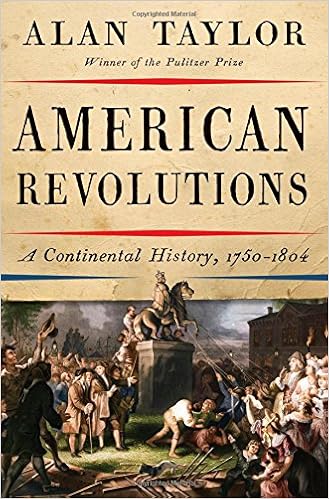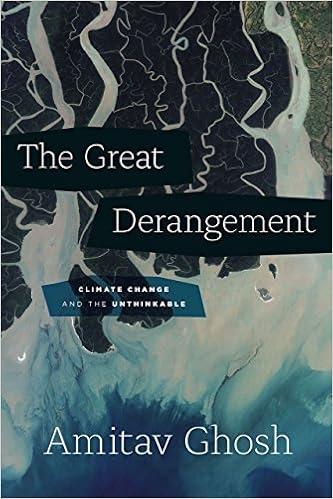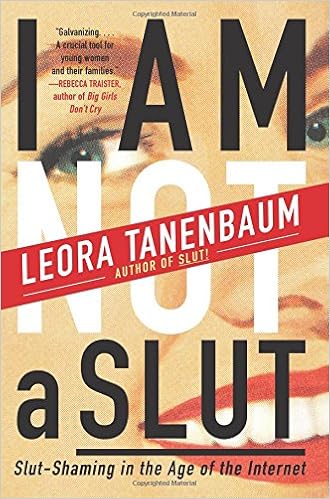
American Revolutions
From the two-time Pulitzer Prize winner, a fresh, authoritative history that recasts our thinking about America’s founding period.
The American Revolution is often portrayed as a high-minded, orderly event whose capstone, the Constitution, provided the ideal framework for a democratic, prosperous nation. Alan Taylor, two-time winner of the Pulitzer Prize, gives us a different creation story in this magisterial history of the nation’s founding.
Rising out of the continental rivalries of European empires and their native allies, Taylor’s Revolution builds like a ground fire overspreading Britain’s mainland colonies, fueled by local conditions, destructive, hard to quell. Conflict ignited on the frontier, where settlers clamored to push west into Indian lands against British restrictions, and in the seaboard cities, where commercial elites mobilized riots and boycotts to resist British tax policies. When war erupted, Patriot crowds harassed Loyalists and nonpartisans into compliance with their cause. Brutal guerrilla violence flared all along the frontier from New York to the Carolinas, fed by internal divisions as well as the clash with Britain. Taylor skillfully draws France, Spain, and native powers into a comprehensive narrative of the war that delivers the major battles, generals, and common soldiers with insight and power.

Black Like Me
In the Deep South of the 1950s, journalist John Howard Griffin decided to cross the color line. Using medication that darkened his skin to deep brown, he exchanged his privileged life as a Southern white man for the disenfranchised world of an unemployed black man. His audacious, still chillingly relevant eyewitness history is a work about race and humanity-that in this new millennium still has something important to say to every American.

Careers in Criminal Justice
Coy H. Johnston’s concise, yet thorough and creative text, Careers in Criminal Justice, prepares students to plan, pursue, and realize their career goals—from conception through the hiring process. The book's contemporary approach emphasizes student self-reflection and pragmatism in the pursuit of self-fulfillment and happiness. With coverage of over forty careers in policing, courts, corrections, and victims services, this text provides a comprehensive overview of the most popular and growing careers in the field. Readers are provided self assessment tools to enhance self awareness and steer them toward realistic and suitable careers in criminal justice.

Charleston Syllabus
This thoroughly remarkable compendium of works about African-American life, edited by the three history professors who started the #CharlestonSyllabus Twitter hashtag, offers solid ground for the oft-requested national conversation about race. Their work firmly connects the dots among slavery, white terror organizations, the Confederate battle flag, and the murders of eight African-American Bible study members in Charleston, S.C., in 2015. . . . This solid offshoot of the original online syllabus (a blockbuster bibliographic tool that’s also included in this volume) is simply a must-read, both for those already versed in these topics and those just getting started. (Publishers Weekly (starred review))

Cuba and the US empire
In this updated edition of her classic, Cuba and the United States: A Chronological History, Jane Franklin depicts the two countries’ relationship from the time both were colonies to the present. We see the early connections between Cuba and the United States through slavery; through the sugar trade; then Cuba’s multiple wars for national liberation; the annexation of Cuba by the United States; the infamous Platt Amendment that entitled the United States to intervene directly in Cuban affairs; the gangster capitalism promoted by Cuban dictator Fulgencio Battista; and the guerilla war that brought the revolutionaries to power.A new chapter updating the fraught Cuban-U.S. nexus brings us well into the 21st century, with a look at the current status of Assata Shakur, the Cuban Five, and the post-9/11 years leading to the expansion of diplomatic relations. Offering a range of primary and secondary sources, the book is an outstanding scholarly work. Cuba and the United States brings new meaning to Simón Bolívar’s warning in 1829, that the United States “appears destined by Providence to plague America with miseries in the name of Freedom.”


Essential documents of American history
Vol 1
This compact volume offers a broad selection of the most important documents in American history: the Declaration of Independence, the Constitution, and the Emancipation Proclamation as well as presidential speeches, Supreme Court decisions, Acts and Declarations of Congress, essays, letters, and much more.
Vol 2
This compact volume offers a broad selection of the most important documents in American history: the Nineteenth Amendment to the Constitution, which ratified women's right to vote; the Supreme Court's decision on Brown v. Board of Education; and the "Heroism and Horror" portion of the 9/11 Commission Report; as well as presidential speeches, Acts and Declarations of Congress, essays, letters, and much more.

Exploring and understanding careers in criminal justice
Criminal justice careers typically fall into one of two categories: law enforcement or legal. But contrary to what many may know about the career opportunities in criminal justice, it is more than just becoming a cop or a lawyer. In Exploring and Understanding Careers and Opportunities in Criminal Justice, Matthew J. Sheridan and Raymond R. Rainville provide a practical, comprehensive guide that easily explains the extensive operations and the scope of employment possibilities and opportunities in the criminal justice profession. They cover many criminal justice functions and career paths that are seldom discussed when preparing for a career in criminal justice. Rainville and Sheridan focus on how to obtain employment in a career field that fits personal strengths and aspirations and emphasize the value of internships and service learning as tools to obtain the desired position.
A career in criminal justice is a process of many potential outcomes. The career professional who plans, continues personal development, and prepares their career path will discover many potential rewards that include satisfaction during and after their career. The field of criminal justice will continue to expand and grow. Legislative mandates will promote new policies and employment opportunities to keep pace with changes and improvements in criminal justice practices to meet needs that enable the career professional to protect and serve. As the title suggests, anyone interested in exploring and understanding the field of criminal justice and the opportunities it can provide needs to read this book. Sheridan and Rainville make it known that there are more options in the field of criminal justice than you thought, and that the process for obtaining employment and developing the career path you desire most can be done!
A career in criminal justice is a process of many potential outcomes. The career professional who plans, continues personal development, and prepares their career path will discover many potential rewards that include satisfaction during and after their career. The field of criminal justice will continue to expand and grow. Legislative mandates will promote new policies and employment opportunities to keep pace with changes and improvements in criminal justice practices to meet needs that enable the career professional to protect and serve. As the title suggests, anyone interested in exploring and understanding the field of criminal justice and the opportunities it can provide needs to read this book. Sheridan and Rainville make it known that there are more options in the field of criminal justice than you thought, and that the process for obtaining employment and developing the career path you desire most can be done!

Extreme killing
Filled with contemporary and classic case studies, this fascinating overview of both serial and mass murder illustrates the many violent expressions of power, revenge, terror, greed, and loyalty. Throughout the book, renowned experts James Alan Fox and Jack Levin examine the theories of criminal behavior and apply them to a multitude of mass and serial murderers from around the world, such as Adam Lanza (Newtown, CT), James Holmes (Aurora, CO cinema), Anders Breivik (Oslo, Norway), Charles Manson (“Helter Skelter”), and Dennis Rader (BTK). This fully updated Third Edition of Extreme Killing helps readers understand the commonalities and variations among multiple murders, addresses the characteristics of both killers and their victims, and, in the concluding chapter, discusses the special concerns of multiple murder victims and their survivors.

The fractured republic
In The Fractured Republic, Yuval Levin argues that this politics of nostalgia is failing twenty-first-century Americans. Both parties are blind to how America has changed over the past half century--as the large, consolidated institutions that once dominated our economy, politics, and culture have fragmented and become smaller, more diverse, and personalized. Individualism, dynamism, and liberalization have come at the cost of dwindling solidarity, cohesion, and social order. This has left us with more choices in every realm of life but less security, stability, and national unity.
Both our strengths and our weaknesses are therefore consequences of these changes. And the dysfunctions of our fragmented national life will need to be answered by the strengths of our decentralized, diverse, dynamic nation.
Levin argues that this calls for a modernizing politics that avoids both radical individualism and a centralizing statism and instead revives the middle layers of society—families and communities, schools and churches, charities and associations, local governments and markets. Through them, we can achieve not a single solution to the problems of our age, but multiple and tailored answers fitted to the daunting range of challenges we face and suited to enable an American revival.
Both our strengths and our weaknesses are therefore consequences of these changes. And the dysfunctions of our fragmented national life will need to be answered by the strengths of our decentralized, diverse, dynamic nation.
Levin argues that this calls for a modernizing politics that avoids both radical individualism and a centralizing statism and instead revives the middle layers of society—families and communities, schools and churches, charities and associations, local governments and markets. Through them, we can achieve not a single solution to the problems of our age, but multiple and tailored answers fitted to the daunting range of challenges we face and suited to enable an American revival.

The great derangement
Are we deranged? The acclaimed Indian novelist Amitav Ghosh argues that future generations may well think so. How else to explain our imaginative failure in the face of global warming? In his first major book of nonfiction since In an Antique Land, Ghosh examines our inability—at the level of literature, history, and politics—to grasp the scale and violence of climate change.
The extreme nature of today’s climate events, Ghosh asserts, make them peculiarly resistant to contemporary modes of thinking and imagining. This is particularly true of serious literary fiction: hundred-year storms and freakish tornadoes simply feel too improbable for the novel; they are automatically consigned to other genres. In the writing of history, too, the climate crisis has sometimes led to gross simplifications; Ghosh shows that the history of the carbon economy is a tangled global story with many contradictory and counterintuitive elements.
Ghosh ends by suggesting that politics, much like literature, has become a matter of personal moral reckoning rather than an arena of collective action. But to limit fiction and politics to individual moral adventure comes at a great cost. The climate crisis asks us to imagine other forms of human existence—a task to which fiction, Ghosh argues, is the best suited of all cultural forms. His book serves as a great writer’s summons to confront the most urgent task of our time.
The extreme nature of today’s climate events, Ghosh asserts, make them peculiarly resistant to contemporary modes of thinking and imagining. This is particularly true of serious literary fiction: hundred-year storms and freakish tornadoes simply feel too improbable for the novel; they are automatically consigned to other genres. In the writing of history, too, the climate crisis has sometimes led to gross simplifications; Ghosh shows that the history of the carbon economy is a tangled global story with many contradictory and counterintuitive elements.
Ghosh ends by suggesting that politics, much like literature, has become a matter of personal moral reckoning rather than an arena of collective action. But to limit fiction and politics to individual moral adventure comes at a great cost. The climate crisis asks us to imagine other forms of human existence—a task to which fiction, Ghosh argues, is the best suited of all cultural forms. His book serves as a great writer’s summons to confront the most urgent task of our time.

I am not a slut
The author of the groundbreaking work Slut! explores the phenomenon of slut-shaming in the age of sexting, tweeting, and “liking.” She shows that the sexual double standard is more dangerous than ever before and offers wisdom and strategies for alleviating its destructive effects on young women’s lives.
Young women are encouraged to express themselves sexually. Yet when they do, they are derided as “sluts.” Caught in a double bind of mixed sexual messages, young women are confused. To fulfill the contradictory roles of being sexy but not slutty, they create an “experienced” identity on social media-even if they are not sexually active—while ironically referring to themselves and their friends as “sluts.”
But this strategy can become a weapon used against young women in the hands of peers who circulate rumors and innuendo—elevating age-old slut-shaming to deadly levels, with suicide among bullied teenage girls becoming increasingly common. Now, Leora Tanenbaum revisits her influential work on sexual stereotyping to offer fresh insight into the digital and face-to-face worlds contemporary young women inhabit. She shares her new research, involving interviews with a wide range of teenage girls and young women from a variety of backgrounds as well as parents, educators, and academics. Tanenbaum analyzes the coping mechanisms young women currently use and points them in a new direction to eradicate slut-shaming for good.

In defense of a liberal education
Zakaria eloquently expounds on the virtues of a liberal arts education―how to write clearly, how to express yourself convincingly, and how to think analytically. He turns our leaders' vocational argument on its head. American routine manufacturing jobs continue to get automated or outsourced, and specific vocational knowledge is often outdated within a few years. Engineering is a great profession, but key value-added skills you will also need are creativity, lateral thinking, design, communication, storytelling, and, more than anything, the ability to continually learn and enjoy learning―precisely the gifts of a liberal education.
Zakaria argues that technology is transforming education, opening up access to the best courses and classes in a vast variety of subjects for millions around the world. We are at the dawn of the greatest expansion of the idea of a liberal education in human history.

The light beyond
It has been a decade since the publication of Dr. Moody's landmark bestseller, Life After Life, and since he coined the term "near-death experience", or NDE. Today, Dr. Moody has studied more than a thousand new case histories of adults and children who have clinically reached the point of death and survived, and extraordinary new research has revealed more patterns of NDEs. Now, for the first time, Dr. Moody presents this wealth of new information to the general public information that uncovers secrets and opens the doors to a powerful message of love from the frontier between life and death.
No comments:
Post a Comment